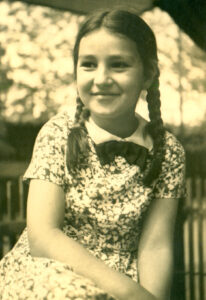Following an early life of hardship, on the run from Nazis and then facing antisemitism in her adopted home of the United States, Dr. Renate Gabriele Lieberg Justin determined that she would heretofore treat others only with respect and compassion.
While Justin eventually rejected religious faith as insufficient to relieve the burden of tragic experience, she embodied Hillel’s Golden Rule: That which is hateful to you, do not do to your fellow.
Justin wrote, “It is the pain I have experienced because of antisemitism that makes me wary of prejudging other people’s belief, of being intolerant, and thereby inflicting pain.”
Justin wrote, “It is the pain I have experienced because of antisemitism that makes me wary of prejudging other people’s belief, of being intolerant, and thereby inflicting pain.”
Throughout her long career as a family medical practitioner and essayist — including a period from 1959-87 in Terre Haute — Justin observed, considered and wrote thoughtfully about her childhood, her family, her patients and life passages that ranged from gentle to nearly unbearable.
Scott Skillman reviews the posthumous What I Have to Tell: A Memoir, which captures Justin’s spare, direct, uncompromising approach, for UHC Reads.
Justin died at age 90 in 2017 in Fort Collins, Colo., where she had continued her medical practice with daughter Ingrid until 1995.
Emotional trauma and family tragedy dealt hard blows

Traumatic events, the result of unchecked antisemitism, capped her early and later years.
When she was 9, in 1936, Justin’s parents put her on a train to Holland, where she attended a Quaker boarding school, out of reach of the Nazis. After much hardship, the family emigrated to the U.S. in 1939, while many relatives remained and perished in the Holocaust.
In 2009, an obsessed assailant murdered Justin’s beloved granddaughter, Johanna.
With her granddaughter’s killer acquitted on grounds of insanity, Justin was left to ponder the nature of paranoia, fanaticism and crimes against humanity.
With her granddaughter’s killer acquitted on grounds of insanity, Justin was left to ponder the nature of paranoia, fanaticism and crimes against humanity.
She quoted her late granddaughter: “I cannot let my hope fly out the window of my spirit when I am in despair about the world’s problems. I am willing to make a difference in many lives globally and transform the hatred that exists into the emotion of love.”
But Justin also wrote, “I no longer believe that we, as Jews, are chosen as ambassadors, as Mr. Jaffe, my Hebrew teacher, taught me. I no longer believe in God, I no longer pray. I found it difficult to accept the condolences of friends who said ‘It was God’s will’ that my granddaughter was murdered.”
Child advocacy remained a lifelong focus
Justin had worked on behalf of abused and neglected children since her first months in the U.S. She continued to serve as a CASA advocate.
She viewed family planning services as vital to child health. In 1970, just more than a decade after Renate married Arthur Justin, who became president of Silverstein Brothers furniture in Terre Haute, she helped establish the community’s first Planned Parenthood clinic.
Justin served as medical director of Planned Parenthood of Vigo County until 1974. The agency, later Planned Parenthood Association of the Wabash Valley, closed in 2016.
Always, she wrote — about medical ethics, end-of-life decisions, her experience as a physician in retirement and some compelling interactions with patients.
One patient’s hatred tested her resolve
In an essay on compassion, Justin admits her own dilemma when a prospective patient, a German immigrant, revealed herself as an unrepentant Nazi.
“It certainly was not the first time I was confronted with antisemites who, unaware that I am Jewish, emptied their venom in front of me.”
Nevertheless, Justin determined the woman merited healing; “demanded and deserved compassion” as any other patient.
“I knew I could be a competent physician for her, but I worried whether I could be a compassionate physician for her.”
“I prefer living out my life with wounds inflicted by antisemitism, and with daily reminders of negative attitudes towards Jews, to being a Nazi,” she wrote.
And so, the patient relieved Justin’s burden when she accepted a referral to another physician.
Justin vowed after the encounter “to examine my own preconceived ideas, especially as related to the practice of medicine.”
Ultimately, she was responsible only for her own actions and behavior. She would be satisfied with that.
“I prefer living out my life with wounds inflicted by antisemitism, and with daily reminders of negative attitudes towards Jews, to being a Nazi,” she wrote.
“I am grateful that I, serendipitously, was born into a German Jewish family during the Holocaust rather than into a pure Aryan family that adopted the Nazi violence. Having had no choice in the matter, I lucked out.”






Ken: your usual flawless, meaningful, masterful writing is on display, here. Thanks for writing and posting this!
Thanks so much for reading and for the gracious compliment, Steve!